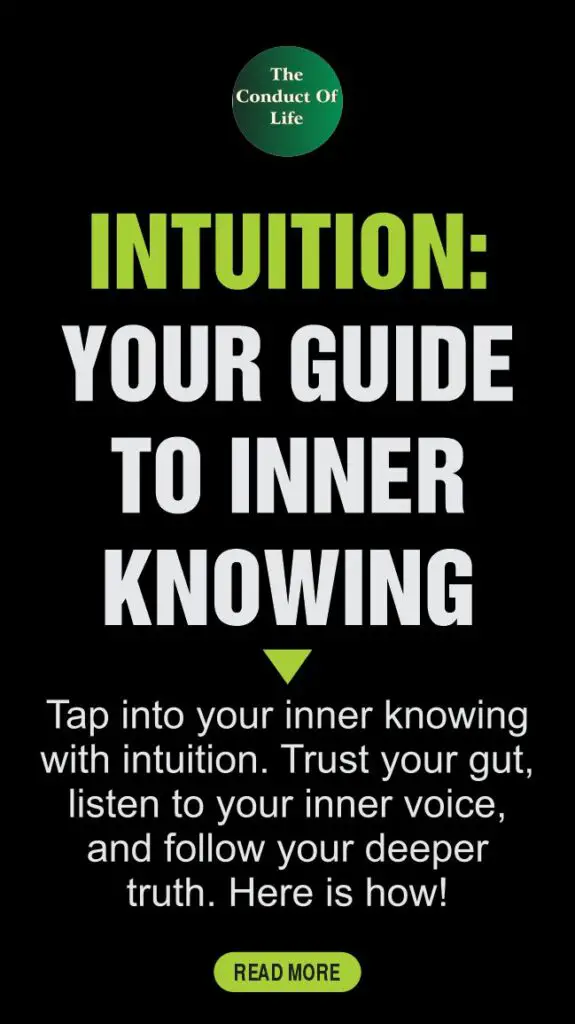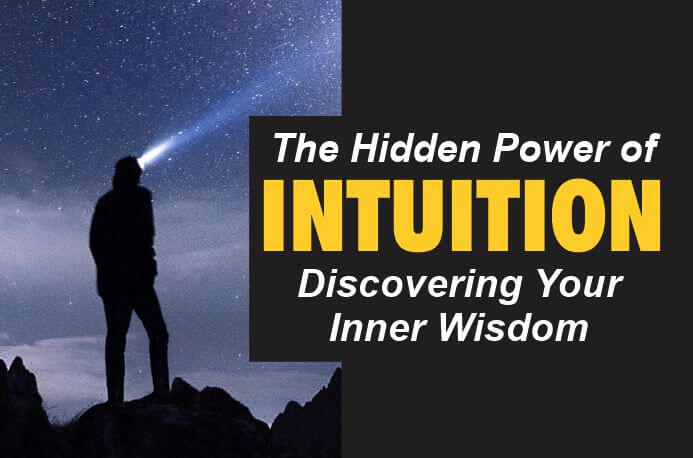What is intuition? It whispers truth before logic speaks. Tap into your inner knowing, strengthen your gut instinct, and live in alignment with the quiet wisdom already inside you.
In moments of uncertainty, there’s a quiet sense that nudges us forward, often subtle, yet deeply persuasive.
This inner feeling can influence our relationships, careers, and even the way we view ourselves.
Many of life’s most powerful choices are not born from analysis, but from a quiet knowing that feels undeniably right.
Throughout history, thinkers, creators, and leaders have acknowledged this force, relying on it when logic had little to offer.
Ralph Waldo Emerson believed it to be a vital link to inner truth, a way of perceiving beyond the surface.
This article discusses that inner signal. You might be trying to strengthen it, trust it more, or simply understand the role it plays in your life. This hub brings clarity to a power often overlooked yet always present.
Recommended: Signs You Are Ignoring Your Intuition

Main Points
- Intuition is a natural cognitive process that taps into subconscious knowledge, guiding us when logic isn’t enough, helping us make quick, informed decisions.
- Intuition manifests in various forms, including emotional, cognitive, spiritual, and physical, each offering unique insights for better decision-making and deeper self-awareness.
- Intuition enhances self-awareness, emotional well-being, and decision-making, offering valuable insights that align with personal values and inner wisdom for a more authentic life.
- To improve your intuitive abilities, practice mindfulness, listen to your gut feelings, and trust your inner guidance by recognizing subtle signals from your mind and body.
Recommended: Differentiating Sensing from Gut Feeling
What is Intuition?
Intuition is your ability to sense something without consciously thinking about it. It’s that gut feeling or inner knowing that guides you, especially when logic doesn’t have all the answers.
Unlike instinct, which is driven by survival, or insight, which comes from sudden realizations, intuition pulls from your past experiences, emotions, and patterns your mind has picked up along the way.
While some people liken it to a psychic energy, it is a natural cognitive process that comes from your brain’s ability to process information unconsciously and quickly.
It’s your subconscious connecting the dots. In moments of uncertainty, intuition helps you make decisions by tapping into knowledge and signals beneath the surface.
While intuitive ability is often associated with mystical or spiritual practices, it is also recognized as a legitimate psychological phenomenon that has been studied and documented by researchers in fields such as neuroscience and psychology.
Recommended: Emotions: How Powerful Can They Be?
Benefits of Intuition

Self-Awareness
Intuition helps you better understand your true self, including desires, values, and emotions, leading to more authentic decisions and self-expression.
Emotional Well-being
Listening to your intuition promotes inner peace, reduces internal conflict, and helps prevent emotional distress by guiding you in alignment with your true feelings.
Problem-Solving
Intuition assists in resolving challenges by offering creative solutions and insights that logic alone may not reveal, enhancing overall problem-solving ability.
Decision-making
When making complex decisions, your inner wisdom considers intellect and emotions, leading to choices aligned with your values and goals, promising satisfaction and fulfillment.
Increased Resilience
Trusting your intuition helps you grow from experiences and bounce back stronger after setbacks, boosting personal growth and resilience.
Improved Relationships
Intuition sharpens your emotional sensitivity, allowing you to better understand others’ feelings, leading to stronger connections and healthier relationships.
Related Posts
- What is Primal Instinct?
- How to Tap into Your Intuition
- Understanding Self-awareness
- Why Women’s Ability to Intuit Is More Powerful Than That Of Men
- Why The Best Leaders Rely On Their Gut Feeling
- What is Extraverted Intuitiveness?
- Intuition vs Instinct: The Clear Differences
- How To Listen To Your Intuition In Relationships
- The Importance Of Cognitive Intuitiveness In Creative Thinking
Types of Intuition
Intuition comes in many forms, each offering unique insights and guidance. From emotional sensitivity to psychic abilities, these different types of intuition help you make better decisions, understand others, and navigate life with greater awareness and clarity.
Let’s take a closer look at them:
Emotional Intuition
Emotional intuition involves perceiving and understanding emotions, both yours and others’.
It enables you to sense emotional undercurrents in a situation, helping you respond more empathetically or strategically.
This form of intuition helps navigate interpersonal dynamics by identifying feelings that aren’t explicitly stated.
Emotional intuition can guide your reactions, whether in conflict resolution, relationships, or assessing the emotional tone of a setting.
It operates through your ability to tune into emotional cues, making it an invaluable skill for enhancing emotional intelligence and making informed decisions based on feelings and empathy.
Cognitive Intuition
Cognitive intuition relies on past experiences and accumulated knowledge to make quick, often unconscious decisions.
Your brain can draw from stored patterns and memories, leading you to conclusions without deliberate reasoning.
This type of intuition helps in situations that require fast judgments, such as solving problems or responding to changes in a business environment.
It’s often associated with expertise and expertise-driven decisions, where the mind recognizes patterns or solutions you may not consciously recall but instinctively know to be correct.
Cognitive intuition helps in managing complex tasks without overwhelming thought processes.
Spiritual Intuition
Spiritual intuition connects you to a higher sense of purpose or universal consciousness.
It can manifest as an inner knowing or guidance that transcends logical thought, offering insights into life’s deeper meaning or guiding moral decisions.
This form of intuition is often linked to a person’s spiritual beliefs or practices and can foster a sense of clarity in moments of doubt.
It offers a broader perspective, allowing you to make decisions aligned with your true values, purpose, or a greater sense of connection with the universe or a higher power.
Physical Intuition
Physical intuition involves tuning into your body’s sensations to interpret its signals, such as tension, discomfort, or subtle energy changes.
These bodily cues can inform you about your environment, health, or even emotional states.
By becoming attuned to these sensations, you gain valuable insights into areas of your life that need attention or adjustment.
For example, a tight chest may indicate stress or anxiety, and a sudden burst of energy might signal a need to take action.
It helps enhance self-awareness and can guide decisions about your well-being, health, or environment.
Creative Intuition
Creative intuition is the ability to generate ideas or insights that aren’t derived from logical reasoning or direct knowledge.
It often arises during brainstorming sessions, artistic endeavors, or when finding innovative solutions to problems.
This form of intuitiveness taps into your unconscious mind, allowing ideas to emerge spontaneously and unexpectedly.
It’s highly valued in creative fields like art, design, and entrepreneurship, where novel solutions or artistic expressions are essential.
It encourages thinking outside the box, bringing fresh perspectives to challenges, and helping to break free from conventional thinking patterns.
Interpersonal Intuition
Interpersonal intuition involves understanding the thoughts, emotions, and motivations of others without explicit verbal communication.
It allows you to read non-verbal cues, body language, and subtle emotional signals in social situations.
It is crucial in relationships, whether personal or professional, helping you navigate social dynamics and build stronger connections.
It provides an intuitive grasp of people’s unspoken feelings and intentions, allowing for better communication and empathy.
Interpersonal intuition helps in understanding the unspoken atmosphere of a room or knowing when someone needs support or a change in approach.
Claircognizance
Claircognizance is a type of intuition where knowledge or insights appear without any clear source or logical reasoning.
It’s a sudden knowing that often emerges in the mind as if the information has been dropped into your consciousness.
Unlike learning through study or experience, claircognizance is an intuitive flash of information that comes seemingly out of nowhere, often providing clarity on complex situations.
This form of knowing can fade quickly, leaving you with the knowledge but no clear understanding of its origin.
Claircognizance often guides individuals toward understanding or decisions that don’t follow rational patterns.
Clairaudience
Clairaudience is the ability to hear sounds, voices, or messages that go beyond normal hearing, often experienced in a quiet, inner auditory space.
These sounds may be warnings, insights, or even messages from beyond, offering guidance.
Many describe hearing subtle whispers, like the word “don’t” when considering a risky action, or receiving advice in moments of uncertainty.
Clairaudience often manifests in a mental or internal voice, and the information received can be surprising or specific.
It helps attune individuals to higher guidance or intuitive alerts, aiding decision-making in moments of need or danger.
Clairsentience
Clairsentience is the intuitive ability to sense the emotions or energies of others.
People with this gift can feel the emotional atmosphere of a room, perceive underlying tensions, or even experience physical sensations connected to others’ feelings.
This intuitive ability helps individuals understand and connect with others on a deeper level, often before words or actions reveal the truth.
It allows for heightened empathy and emotional awareness, which can be valuable in navigating relationships, conflict resolution, and offering support to others.
Clairsentience is often used to discern emotional energy that’s not immediately visible or consciously recognized.
Clairvoyance
Clairvoyance is the ability to see images, symbols, or events beyond normal sensory perception, often related to future occurrences or unseen realities.
Individuals with clairvoyance may visualize scenes, symbols, or even receive warnings about situations or people.
This intuition is strongly linked to the third eye, a spiritual concept that allows access to higher truths or hidden knowledge.
Clairvoyance is often seen in psychic readings or spiritual experiences where a person receives imagery that provides clarity or direction.
It’s a powerful form of intuition that provides foresight and awareness beyond what is perceivable through conventional senses.
Recommended: 14 Reliable Books On Intuition
How Intuition Works: Understanding Your Inner Guide

Intuition is the sense that something is right or wrong, and you follow it without conscious thought. But how does intuition work?
Let’s break it down.
The Subconscious Mind at Work
Your brain is constantly processing information, much of which happens without you realizing it.
The conscious mind only handles a small fraction of the data your brain picks up. The rest is processed by your subconscious, which is where intuition comes into play.
Your subconscious acts like a storage unit, keeping all the experiences, knowledge, and lessons you’ve gathered over the years.
When you’re faced with a new situation, your brain compares it to these stored memories.
If it detects a match, it sends you a signal, this is what you experience as intuition.
It’s not a mystical power; it’s your brain’s way of making quick decisions based on everything you’ve learned.
Recognizing Patterns and Making Decisions
One of intuition’s primary functions is pattern recognition. Your subconscious constantly scans your environment for familiar details, even ones you might not consciously notice.
It picks up on body language, tone of voice, subtle changes in your surroundings, and more, which helps you quickly make sense of a situation.
Take a seasoned firefighter, for example. They can feel when a building might collapse, not because they’ve seen it happen recently, but because their brain has picked up on signs like cracks in the walls or changes in the air pressure.
These small, almost invisible cues trigger an immediate gut reaction.
Emotional and Physical Cues
Intuition doesn’t only happen in your mind; it also involves your emotions and physical sensations.
Have you ever had a strong sense about someone or something, even without clear reasons?
Those feelings are your subconscious mind processing past experiences, emotions, and outcomes, which it then uses to guide you.
Your inner knowing can also show up physically. You might get a sudden rush of anxiety, feel calm, or notice a tightness in your chest or stomach.
These physical sensations are your body’s way of telling you that something is off or right based on previous experiences.
Intuition vs. Rational Thinking: A Balance
Some people think intuition and rational thought are opposites, but they can complement each other.
Intuition helps guide you in a direction, but rational thinking lets you dive deeper, analyze the situation, and weigh your options.
When you combine both, you get a balanced approach to decision-making.
Intuition can point you to the right answers, while logical analysis helps you back up those instincts with facts and reasoning.
Using both together allows you to make decisions faster and with more confidence.
Related: The Dark Side Of Gut Feeling
Signs and Signals of Intuition: How to Recognize Your Inner Guide

Intuition speaks to you in different ways, helping guide your decisions.
While it may be subtle, learning to recognize its signals can improve your ability to make choices.
Here’s how it shows up and how you can better tune into it.
Gut Feeling or Persistent Instinct
One of the most common signs of intuition is that gut feeling that keeps nudging you in a specific direction.
It’s not the same as fear or anxiety, which usually come from external triggers or past experiences.
It tends to feel calm and steady, guiding you in ways that make sense even if you don’t have all the facts.
If you’ve ever had that instinct to do something, even without fully understanding why, you’ve felt intuition in action.
It’s not just a random thought; it’s your mind pulling from past experiences to guide you toward the right choice.
“Aha” Moments: Sudden Clarity
Another strong sign of intuitiveness is a sudden burst of clarity. You know those moments when a solution to a problem or an idea comes to you without warning?
This is often a result of your subconscious mind processing information and presenting it to you in an instant.
It might happen while you’re meditating, journaling, or just sitting quietly, letting your thoughts flow.
When you experience an “aha” moment, pay attention. These moments often align with your deeper instincts and can provide the answers you’re looking for, even amid confusion.
Physical Sensations: Your Body Talks to You
Your body is another way intuition makes itself known. Physical sensations like chills, warmth, or an increased heart rate can be signs that your intuition is trying to guide you.
For instance, you might feel a sudden calm when making a decision that feels right, or a tightening in your chest when something doesn’t sit well.
These physical responses are worth noting. However, it’s important to distinguish between intuition and fear.
Fear tends to feel overwhelming and is often linked to anxiety, while intuition feels more grounded and reassuring.
Being able to tell the difference comes with practice and self-awareness.
Distinguishing Intuition from Fear
It’s easy to confuse intuition with fear, especially when the feeling is strong. But there’s a key difference: intuition tends to be calm and centered, while fear can be chaotic and unsettling.
Fear is often based on past experiences or worries about what could happen, while intuition is about being present in the moment and sensing what feels right.
When you feel a strong reaction, take a step back and reflect. Ask yourself if the feeling is based on past experiences, or if it’s a quiet knowing about what’s best for you in the current situation.
This clarity will help you trust your intuition more confidently.
How to Strengthen and Develop Your Intuition

Building a stronger connection to your intuition is a process that takes consistent practice.
By adding specific habits to your daily routine, you can tap into your inner guidance more easily and confidently. Here are a few steps to help you along the way.
Start Journaling Daily
Journaling is a great way to connect with your inner thoughts and feelings. By writing freely each day, you give yourself space to reflect on your experiences, which can help you recognize subtle intuitive insights.
Over time, you’ll begin to notice patterns in your thoughts that align with your instincts, giving you a clearer sense of direction.
Try Meditation for Mental Clarity
Meditation is one of the best practices for clearing your mind and strengthening your connection to your inner guidance.
Spend a few minutes each day sitting quietly and focusing on your breath. If you’re seeking insight for a specific situation, visualize the problem as you meditate.
Let thoughts and feelings come and go without judgment. This practice helps you become more aware of your inner voice, making it easier to pick up on subtle nudges that guide you.
Spend Time Alone
Solitude is vital for developing your intuitive abilities. When you’re alone, you can reflect without distractions or external influences. Spending time in nature is especially helpful.
Take walks outdoors or sit quietly in a natural setting. These moments can ground you and make it easier to hear your inner guidance.
Nature has a calming effect, which can boost your ability to tap into your subconscious thoughts and insights.
Practice Exercises to Strengthen Your Instincts
To develop your intuitive abilities, try specific exercises that encourage you to trust your gut. For example, ask yourself a question and sit in a calm state, then pay attention to any instinctive responses.
You can also practice making small decisions based on your feelings. Try choosing what to eat or wear based on your gut instinct.
As you continue trusting these responses, your intuitive abilities will grow stronger and more reliable.
It guides choices about trust, connection, and understanding relationship dynamics, contributing to healthier and more fulfilling personal connections.
Using Intuition in Different Areas of Life

Your intuition is a powerful tool that can guide you in various aspects of life, especially when it comes to relationships and career decisions.
By learning to recognize and trust your gut feelings, you can make choices that align with your true desires and goals.
Intuition in Relationships
Intuition plays a big role in how you connect with others. It can help you understand the authenticity of your relationships, whether with friends, family, or romantic partners.
For example, if you feel uneasy in a social setting, it might be your intuition signaling a lack of trust or compatibility.
These gut feelings can provide insights into whether a connection is genuine or not.
By trusting these signals, you can make more informed decisions, leading to healthier and more meaningful relationships.
Intuition in Career Choices
In the professional world, intuition can also guide your career decisions. Many successful people credit their intuitive sense when making important job choices.
For example, if you’re deciding between two job offers, your intuition might help you choose based on the company culture or how well the role aligns with your values.
While logic is important, intuitive insights can often lead you to a path that brings more satisfaction and success in the long run.
Trusting your gut when making career decisions can ultimately lead to a more fulfilling work life.
Boosting Creativity and Problem-Solving
Intuition can also be a valuable asset when you’re facing challenges or looking for creative solutions.
Sometimes, the best ideas don’t come from logical reasoning alone but from your ability to tap into your subconscious.
Engaging with your inner intelligence can open up new ways of thinking and problem-solving that wouldn’t emerge otherwise.
Practices like mindfulness, meditation, and journaling can help you tune in to your inner voice and strengthen this ability.
As you become more attuned to your intuitive insights, you’ll find it easier to navigate both personal and professional challenges.
Overcoming Barriers to Intuition

Accessing your inner wisdom can sometimes be difficult due to common obstacles like doubt, fear, and societal expectations.
These barriers can prevent you from tapping into your instincts and hinder your personal growth.
Doubt: The First Obstacle
Doubt often stands in the way of trusting your inner guidance. When you’re faced with important decisions, you may second-guess your gut feelings and hesitate to act on them.
This uncertainty can prevent you from moving forward. To overcome doubt, start by becoming more self-aware.
Simple practices like journaling or meditation help you understand your thoughts and emotions.
The more you reflect on your experiences, the easier it will be to recognize when your instincts are guiding you.
Fear: Holding Back from Your Gut Feelings
Fear is another major barrier. Many people worry that acting on their instincts might lead to poor decisions or judgment from others.
This fear can cause you to suppress your instincts. To overcome fear, start by making small decisions based on your gut feeling, like choosing what to eat or where to go.
As you get more comfortable with these low-stakes choices, you can gradually build confidence in your ability to trust your intuition for more significant decisions.
Societal Conditioning: Letting Go of Logic
From a young age, many of us are taught to rely on logic and reason, often dismissing gut feelings as unreliable.
This societal conditioning can create a disconnection from your inner wisdom. To combat this, embrace practices that encourage intuitive development.
Spending time in nature, engaging in creative activities, and exploring discussions about intuition can help you reconnect with your inner knowing.
By challenging these societal influences, you can rebuild your trust in your instincts.
The Role of Intuition in Personal Growth
Intuition plays a key role in personal growth by helping you make decisions that align with your true self.
It’s that inner voice guiding you through life’s complexities, providing clarity when you’re unsure.
Many people have found that trusting their instincts leads to greater satisfaction, whether in relationships or career choices.
For example, when faced with a decision, your intuition may guide you to choose what truly resonates with your values, even if it’s not the most logical option.
As you embrace this inner guidance, you develop a deeper understanding of who you are and what you want.
Strengthening your intuition allows you to make confident, authentic choices that support your growth and happiness.
Integrating Intuition into Your Daily Life
Incorporating intuition into your daily routine requires you to consciously tune into your inner voice and trust the guidance it provides.
Start by practicing mindfulness. By being more aware of your thoughts and emotions, you create space for intuitive insights to emerge.
Simple techniques like deep breathing or quick meditation sessions can help you connect with your intuition more easily.
These moments of stillness make it easier for your inner wisdom to guide you throughout the day.
Reflecting on Your Decisions
When making decisions, take a step back and tune into your gut feeling. Instead of relying only on logic, pause and assess how each option feels emotionally and physically.
Reflecting on how your choices align with your true self helps you recognize the power of your intuition.
Journaling can be a great way to clarify these feelings and identify patterns in your decisions.
Over time, you’ll get better at recognizing when your intuition is at play, making it easier to trust it in the future.
Stay Present for Better Intuition
Being present in the moment can help you access your intuitive thoughts more clearly.
Activities like cooking or walking, where you focus on the task at hand, allow your intuition to flow.
Paying attention to bodily sensations or engaging in creative activities can also boost your awareness.
By incorporating small, mindful actions into your routine, you make it easier for your intuition to guide you reliably, improving your daily decisions and overall well-being.
Frequently Asked Questions
What is intuition?
Intuition is the ability to sense or know something without conscious reasoning. It’s a deep, subconscious process based on past experiences and knowledge.
How can I tap into my intuition?
Practice mindfulness, listen to your emotions, trust your gut feelings, and reflect on past experiences to enhance your connection with your inner knowing.
Can intuition be wrong?
Intuition is generally accurate, but it can be influenced by bias or fear. Distinguishing intuition from anxiety can help avoid misjudgments.
How do I know if it’s intuition or fear?
Intuition is calm and centered, while fear is often chaotic. Take time to reflect on the emotion, as intuition feels grounded and reassuring.
Conclusion
Intuition is a powerful tool that helps guide us through life’s complexities, offering insights that go beyond logical reasoning.
By learning to recognize the subtle cues your body and mind give, you can strengthen your connection with your inner wisdom.
Trusting intuition brings emotional balance, improved decision-making, and a deeper understanding of yourself.
Embracing this quiet, yet profound, knowing leads to greater authenticity and fulfillment.
Cultivate your intuition to navigate both the simple and challenging moments of life with confidence and clarity.
References
- https://psychcentral.com/blog/connecting-to-your-inner-wisdom
- https://www.linkedin.com/pulse/intuition-instant-discover-your-inner-wisdom-through-dowsing-hagan?trk=articles_directory
- https://www.everand.com/book/225123619/Discover-Your-Inner-Wisdom-Using-Intuition-Logic-and-Common-Sense-to-Make-Your-Best-Choices
- https://medium.com/@virtued.reception/unveiling-the-power-of-intuition-your-guide-to-inner-wisdom-df1ce27049ee
- https://www.creativitypost.com/article/intuition_as_the_basis_for_creativity
- How to measure intuition
- The Science behind intuition
Pious Clements is the insightful voice behind "The Conducts of Life" blog, where he writes about life ethics, self-development, life mastery, and the dynamics of people and society.
With a profound understanding of human behaviuor and societal dynamics, Pious offers thought-provoking perspectives on ethical living and personal growth.
Through engaging narratives and astute observations, he inspires readers to navigate life's complexities with wisdom and integrity, encouraging a deeper understanding of the human experience and our place within society.
